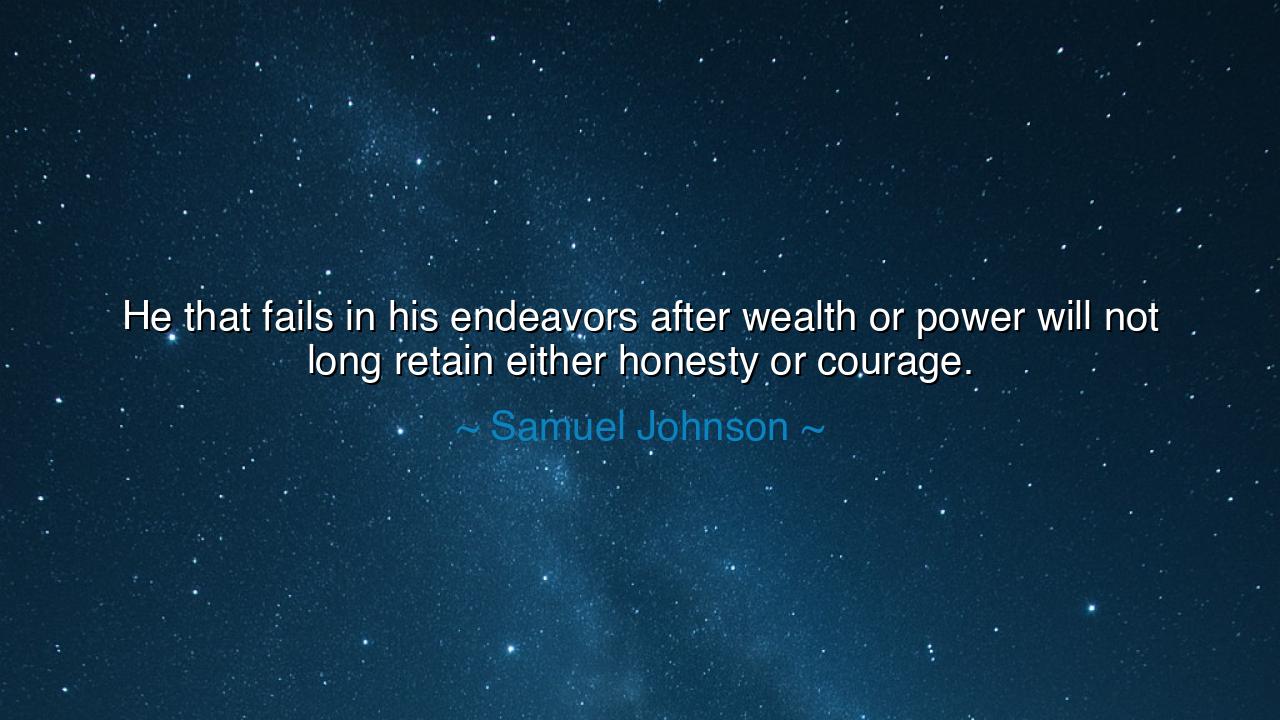
He that fails in his endeavors after wealth or power will not
He that fails in his endeavors after wealth or power will not long retain either honesty or courage.






The wise Samuel Johnson, philosopher, lexicographer, and moral essayist, once said: “He that fails in his endeavors after wealth or power will not long retain either honesty or courage.” In these few words, Johnson lays bare one of the most profound truths of human nature—that failure, if not met with virtue, can corrode the soul. His statement is not a condemnation of failure itself, but a warning about the frailty of character when ambition is not balanced by moral strength. For in the pursuit of greatness, many begin with noble intentions; yet, when their efforts collapse, they turn bitter, abandoning honesty and losing courage, as if virtue were only worth keeping when rewarded.
To understand the origin of these words, we must look into the mind of Johnson, a man who knew both struggle and integrity. Living in eighteenth-century England, he walked the narrow bridge between poverty and fame, between skepticism and faith. He observed the vanity of men who sought wealth or influence without wisdom—and worse, the despair of those who, when defeated, allowed disappointment to poison their souls. Johnson saw that the true test of character does not lie in victory, but in how one endures defeat. When a man fails and yet remains honest, he is still rich in spirit; when he fails and keeps courage, he is not defeated but refined. But when both vanish—when he loses faith in goodness and the strength to rise again—then he is truly lost.
The philosopher’s warning reflects the ancient truth that adversity reveals the inner mettle of the heart. In times of ease, anyone can appear virtuous, for comfort hides corruption. But when hardship strikes—when dreams fall and ambitions crumble—then the soul shows its true shape. Those who cannot bear the sting of disappointment may seek solace in deceit, twisting the world to justify their failure, or they may sink into cowardice, retreating from life’s challenges. Thus, Johnson teaches that the danger of failure is not the loss of wealth or power, but the loss of integrity and resilience, the very qualities that define the greatness of the human spirit.
History itself bears witness to this lesson. Consider the life of Napoleon Bonaparte, who rose from obscurity to rule Europe with genius and ambition. Yet when fortune turned against him, his pride curdled into tyranny, and he could no longer bear the humility of loss. In his fall, one sees not merely the collapse of empire, but the erosion of honesty and courage—the unwillingness to accept defeat with dignity. Contrast this with Abraham Lincoln, who failed in business, lost elections, and suffered ridicule before rising to lead a fractured nation. Lincoln’s greatness lay not in power alone, but in his refusal to let failure make him bitter. He kept both courage and honesty, and from that endurance came the strength to unite a people.
Johnson’s insight reaches beyond politics and war; it speaks to the private struggles of every human being. In the pursuit of success—be it in work, love, or art—failure is inevitable. The true danger is not in falling, but in what one becomes afterward. The person who, after failure, clings to resentment will soon betray truth to ease his pain. The one who hides behind excuses loses the courage to begin again. Yet those who meet loss with humility and steadiness become, paradoxically, richer in character than they ever were in success. For courage deepens through trial, and honesty shines brightest when there is nothing left to gain.
In Johnson’s wisdom lies an unspoken challenge: to make virtue the anchor, not the ornament, of our ambitions. When we strive for wealth or power, we must do so with integrity, so that even if we fail, we do not lose ourselves. For honesty is the root of peace, and courage is the path to renewal. To preserve both is to triumph over defeat itself. The man who fails but remains virtuous has succeeded in the higher realm of the soul, while the man who succeeds but sacrifices integrity has failed where it matters most.
So, my children of the spirit, remember this enduring law: character is not tested by success, but by failure. If fortune deserts you, let not your heart desert itself. Keep your honesty, even when lies would make life easier; keep your courage, even when fear whispers of surrender. For as Johnson teaches, wealth and power are fleeting, but integrity is eternal. The wise do not measure life by their victories, but by the virtue with which they endure their defeats—and from that virtue, all true greatness is born.






AAdministratorAdministrator
Welcome, honored guests. Please leave a comment, we will respond soon